| Author |
Message |
David.
Citruholic

Joined: 09 Nov 2009
Posts: 400
Location: San Benito , Texas
|
| Posted: Mon Nov 09, 2009 7:24 pm |
|
I saw joe's example on bark grafting , and i wanted to attempt it
but i dont know how high you can go on the graft , or how thick the branch need to be to graft into it .
I am new and tried some t budding on my citrus but only got 1 out of 3 to catch , but i see bud grafting catches quicker and better .
Sorry for these questions but i am new to this grafting thing
_________________
South Texas gardener |
|
| Back to top |
|
 |
Skeeter
Moderator

Joined: 23 Jul 2006
Posts: 2218
Location: Pensacola, FL zone 9
|
| Posted: Tue Nov 10, 2009 9:49 pm |
|
There is no limit to how high you can use any graft. I have done both T-buds and bark grafting on a ladder. Size of the stock for T-budding is best between 1/4 inch and 1/2 inch and buds are best from 2nd or 3 flush sections from the scion.
Bark grafting can be done on much larger stock--even stock that is more than 1 inch in diameter, but it can also be done on stock as small as 1/4 inch if you use toothpick size scions.
_________________
Skeet
 |
|
| Back to top |
|
 |
ivica
Moderator


Joined: 08 Jan 2007
Posts: 651
Location: Sisak, Croatia, zone 7b
|
| Posted: Wed Nov 11, 2009 6:34 pm |
|
I did a few bark grafts of various sizes this spring.
Photos below (taken today) shows results:
Graft1: done in early spring
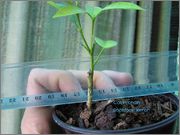
Graft2: done in early spring
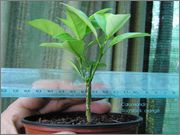
Graft3: done in early spring
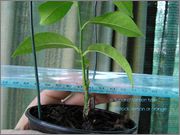
Graft4: done in late spring
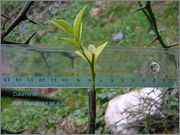
Graft5: done in late spring
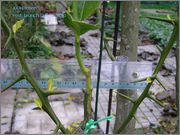
Tiny graft is OK if there is no other options.
Thicker graft is easier to do and grows better.
_________________
 |
|
| Back to top |
|
 |
David.
Citruholic

Joined: 09 Nov 2009
Posts: 400
Location: San Benito , Texas
|
| Posted: Wed Nov 11, 2009 7:20 pm |
|
I found it very hard to try to pu a flat citrus scion onto a seemingly round root stock and or branch any suggestions
_________________
South Texas gardener |
|
| Back to top |
|
 |
ivica
Moderator


Joined: 08 Jan 2007
Posts: 651
Location: Sisak, Croatia, zone 7b
|
| Posted: Wed Nov 11, 2009 7:34 pm |
|
David,
I guess you have knife with straight blade, if so then maybe curved blade could help.
Check this knife photos for various options:
http://www.ryset.com/gknives.html
_________________
 |
|
| Back to top |
|
 |
Skeeter
Moderator

Joined: 23 Jul 2006
Posts: 2218
Location: Pensacola, FL zone 9
|
| Posted: Wed Nov 11, 2009 9:58 pm |
|
A curved knife might help, but I have never had a problem with a straight blade. One thing you can do that might help, is to look for a flat side on the stock--that will give you a better fit.
Hovever, it is not the fit of the "wood" that really matters here--it is the contact of the cut edge of the scion with the inner surface of the bark on the stock that matters. That is why Joe has suggested trimming the edges and as Sylvian suggested, it is even better if those edges are cut at a slight angle to improve contact with the cambium.
_________________
Skeet
 |
|
| Back to top |
|
 |
mrtexas
Citruholic


Joined: 02 Dec 2005
Posts: 1026
Location: 9a Missouri City,TX
|
| Posted: Thu Nov 12, 2009 1:14 am |
|
Use texas bark graft on rootstock up to 3-4 inches. If tree is bigger, go up until the branches are 3-4 inches
See this link:http://members.fortunecity.com/pjsauber/BarkInlayGraft.htm |
|
| Back to top |
|
 |
David.
Citruholic

Joined: 09 Nov 2009
Posts: 400
Location: San Benito , Texas
|
| Posted: Thu Nov 12, 2009 10:34 pm |
|
| mrtexas wrote: | Use texas bark graft on rootstock up to 3-4 inches. If tree is bigger, go up until the branches are 3-4 inches
See this link:http://members.fortunecity.com/pjsauber/BarkInlayGraft.htm |
thx for link texas and i did a few differnt grafts on my mexican lime i did soem clefts t budding and bark grafting , i wanna see the difference and see which i am best at
_________________
South Texas gardener |
|
| Back to top |
|
 |
baumgrenze

Joined: 19 Apr 2007
Posts: 20
Location: Palo Alto, CA
|
| Posted: Mon Jan 24, 2011 4:14 am |
|
I could swear I posted this knife here before, but I did a search and cannot find it.
I took a broken 1/8" aircraft drill, i.e., it was at that point just 1/8" high speed tool steel rod and annealed it thoroughly. I put it on the coals of a barbecue fire and fished it out the next morning. That made it easy to file, grind and bend, although I used a propane torch to heat it red hot when I flattened and bent the curved end. I then heated it red hot and hardened it by plunging it into a container of old motor oil. I polished off the blue color and tempered it by carefully heating it with the torch, starting in the middle of the rod and watching until the peacock colors moved to the cutting end. Just before they got there I plunged it into oil again to quench the temper, and I polished and sharpened it. I cut a thread on the bitter end and fit it into a dowel rod handle. I slip the tool between the bark flaps on a bark graft and then pull it towards the cut off end on the accepting branch. This flattens the surface to match the flat surface of the scion.
You can readily find a description of tempering hardened tool steel with a Google search. Knife smithing is fun to do on small pieces like this.
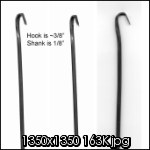
Uploaded with ImageShack.us |
|
| Back to top |
|
 |





















